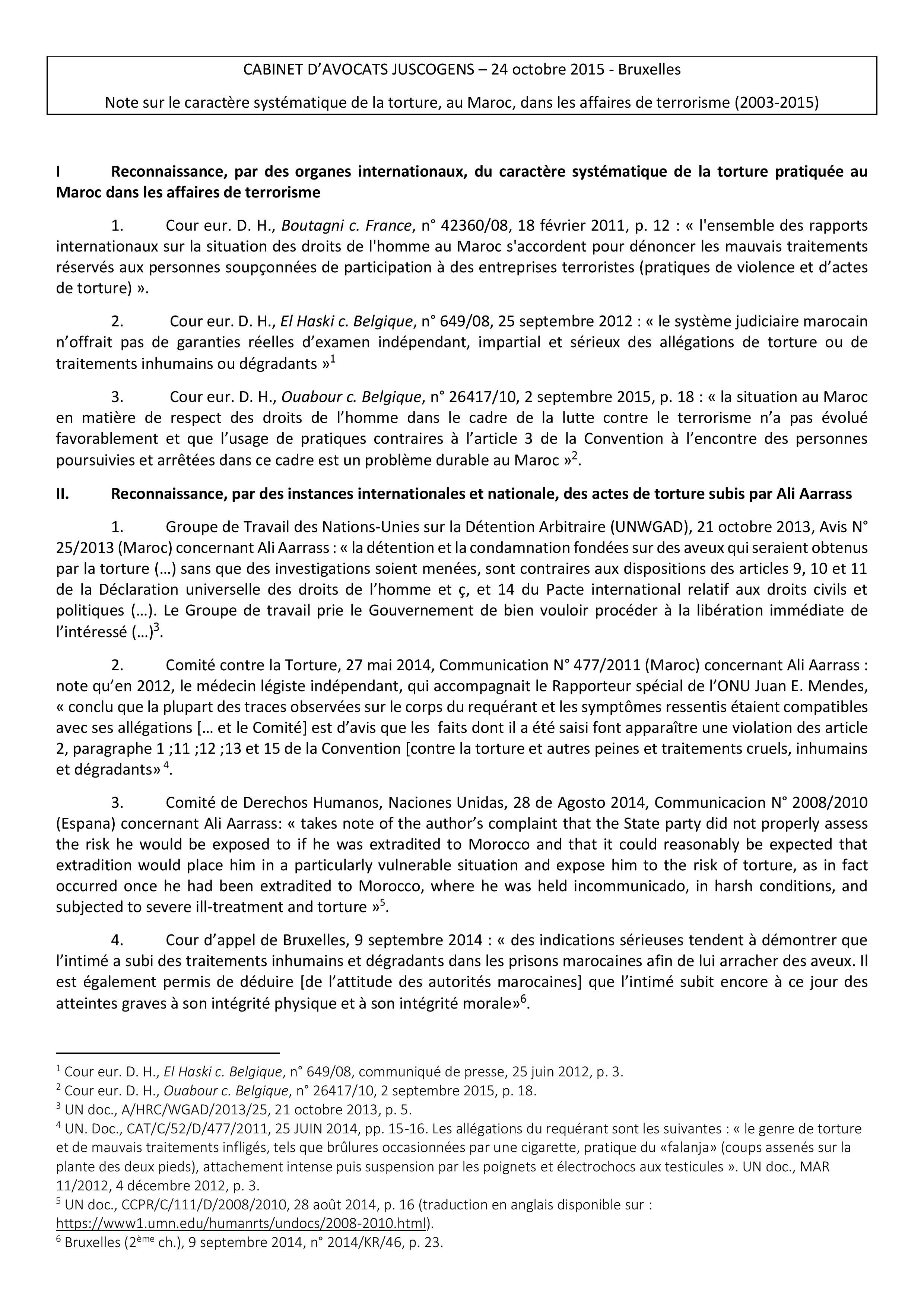URGENT ACTION
RISK OF TORTURE IF MAN RETURNED TO MOROCCO
Ali Aarrass, a dual Belgian/Moroccan national, could be forcibly returned from Spain to Morocco at any time, after the Spanish Council of Ministers approved his extradition on 19 November. In Morocco, he would be at risk of incommunicado detention, torture and other ill-treatment, and of unfair trial.
On 19 November 2010, the Council of Ministers gave final approval to Morocco’s extradition request regarding Ali Aarrass, a dual Belgian/Moroccan national. At the same time, the Council refused to extradite Mohammed el Bay, who has dual Spanish and Moroccan citizenship.
Ali Aarrass and Mohammed el Bay have been held since 1 April 2008, when they were arrested in the Spanish city of Melilla, on the basis of international arrest warrants issued by Morocco on 28 March 2008. The Spanish national criminal court (Audiencia Nacional) authorized the extradition of Ali Aarrass to Morocco on 21 November 2008. The decision was confirmed on appeal on 23 January 2009, on the assurance from the Moroccan government that Ali Aarrass would not be sentenced to the death penalty or life imprisonment without parole.
Ali Aarrass is wanted in Morocco on terrorism-related charges and is accused of belonging to a terrorist network headed by Abdelkader Belliraj. Thirty-five individuals were arrested in early 2008 in connection with the “Belliraj Cell” and a number of them have reportedly been tortured by members of the Directorate for the Surveillance of the Territory (Direction de la surveillance du territoire, DST), an intelligence body, during their incommunicado detention at the Témara detention centre. They were convicted on appeal in July 2010 in a trial marred by procedural irregularities and unexamined claims of torture and other ill-treatment.
Ali Aarrass had been under investigation since 2006 by the Spanish National Criminal Court on terrorism-related charges, but on 16 March 2009, the court provisionally closed its investigation against him on the basis of lack of evidence. Ali Aarrass is currently being detained in Spain only on account of the extradition request by Morocco.
PLEASE WRITE IMMEDIATELY in Spanish, English or your own language:
- urging the Spanish authorities not to extradite Ali Aarrass to Morocco, as he would be at risk of incommunicado detention, torture and other ill-treatment, and unfair trial;
- pointing out that the forcible return of Ali Aarrass to Morocco would constitute a breach of the principle of non-refoulement and a violation of Spain’s obligations under the European Convention on Human Rights, the International Covenant on Civil and Political Rights and the UN Convention against Torture and Other Cruel, Inhuman or Degrading Treatment or Punishment.
PLEASE SEND APPEALS BEFORE 4 JANUARY 2011 TO:
Minister of Justice
Sr. D. Francisco Caamaño Dominguez
Ministerio de Justicia
C/ San Bernando 45
28015 Madrid, Spain
Fax: +34 91 390 22 77 Email: comunicaciudadano@sb.mju.es
Salutation: Dear Minister / Estimado Señor Ministro
President of the Council of Ministers
Sr. D. José Luis Rodríguez Zapatero
Complejo de la Moncloa,
Avda. Puerta de Hierro, s/n.
28071 Madrid, Spain
Fax: +34 91 335 33 82
Email: jlrzapatero@presidencia.gob.es
Salutation: Dear President / Estimado Señor Presidente
Also send copies to diplomatic representatives accredited to your country. Please check with your section office if sending appeals after the above date. This is the first update of UA: 106/09 EUR 41/007/2009 (http://www.amnesty.org/en/library/info/EUR41/007/2009)
URGENT ACTION
RISK OF TORTURE IF MAN RETURNED TO MOROCCO
ADditional Information
Spain is a state party to several treaties that prohibit the return of anyone to a country where they would be at risk of torture, including the European Convention on Human Rights, the International Covenant on Civil and Political Rights and the UN Convention against Torture and Other Cruel, Inhuman or Degrading Treatment or Punishment.
Amnesty International is concerned by the persistent reports of continuing human rights violations in the context of countering terrorism in Morocco. These include secret and incommunicado detention; unexamined claims of torture or other ill-treatment and flawed legal proceedings.
The Moroccan authorities periodically announce the dismantlement of terrorist networks affiliated with al-Qa’ida. Statements by the Moroccan official news agency claim that such networks plan attacks inside the country, as well as recruit Moroccan nationals to join armed groups in Iraq or Afghanistan. Such announcements, for instance made on 23 September 2009, 26 April 2010 and 18 August 2010, generally come in the wake of reports of arrests and incommunicado detention of scores of individuals.
Members of the Directorate for the Surveillance of the Territory (Direction de la surveillance du territoire, DST), an intelligence body, continue to arrest, detain and interrogate individuals suspected of involvement in terrorism-related activities. Amnesty International is concerned that such individuals are held incommunicado in an unrecognized detention centre, believed to be the Témara detention centre, which is located in a forested area about 15 kilometres from Rabat, and subjected to torture or other ill-treatment.
Among the most frequently reported methods of torture are: beatings, the suspension of the body in contorted positions, and the threat of rape or other sexual abuse of the detainees’ female relatives. Other reported methods include rape by the forced insertion of objects into the anus, sleep deprivation, cigarette burns, and the application of live electrodes to the body. The purpose of the torture seems to be to extract information about terrorist networks, including those seeking to recruit Moroccans to join armed groups in Iraq or Afghanistan, or in order to extract “confessions”.
Evidence tainted by allegations of torture or other ill-treatment continues to be used in legal proceedings. According to information available to Amnesty International, information contained in statements based on interrogation reports prepared by the DST, while the suspects were in their custody, continues to be used as the basis of prosecutions and as evidence in trial proceedings. Amnesty International is also concerned that the right to an adequate defence is not fully respected in terrorism-related cases. For instance, individuals are frequently brought in front of the judicial authorities for the first time only after prolonged periods of incommunicado detention, and without the presence of a lawyer. In several cases known to Amnesty International, the investigative judge does not inform the suspects of their rights to be assisted by a lawyer. In addition, Amnesty International has received reports that lawyers are not always permitted to access a copy of their clients’ files, impeding their ability to present an adequate defence.
This is the first update of UA 106/09 (AI Index: EUR 41/007/2009, issued on 21 April 2009). Issue Date: 23 November 2010
FU on UA 106/09 Index: EUR 41/004/2010






